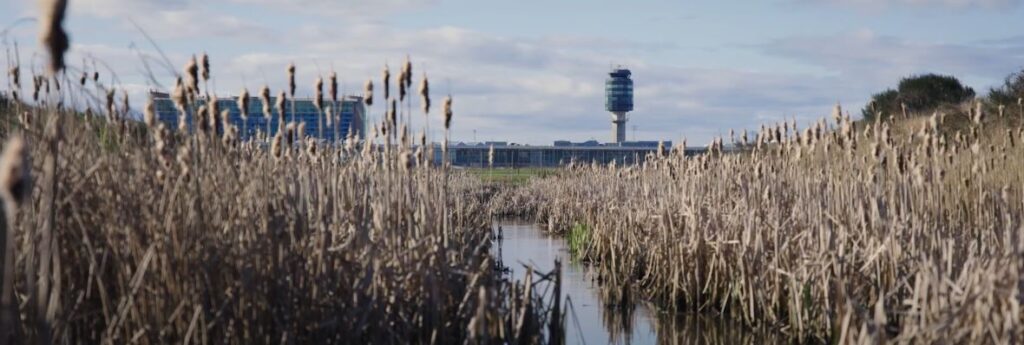Vancouver International Airport (YVR) is the first airport in North America to achieve “Salmon-Safe” certification and has become the first organization in Canada to be recertified for another five years.
The renewal acknowledges YVR’s continued efforts and commitment to ensure its land and water management practices protect Fraser River water quality and enhance the habitat so Pacific salmon can thrive, and further represents the airport’s “leadership role in shaping a greener tomorrow.”
In collaboration with Musqueam (indigenous community), the airport says it is continuing to enhance the habitat on Sea Island and protect its ecosystem as part of its aim to become “the world’s greenest airport.”
“At YVR, we have a long history of sustainability and are proud to be at the forefront of creating a greener, more resilient future for aviation as well as our community,” said Marion Town, Director of Climate and Environment, Vancouver Airport Authority. “In following our Environmental Management Plan, YVR has set clear intentions to reduce YVR’s impact on the environment and our Salmon-Safe recertification is another major milestone as we work towards our ambitious goals.”
Salmon-Safe is a site-specific certification program recognizing progressive, environmentally friendly land and water management practices. The Fraser Basin Council co-manages Salmon-Safe in British Columbia, in partnership with Salmon-Safe Inc. in Portland. When first certified in 2016, YVR was given 10 conditions to meet Salmon-Safe standards which included changes in some of YVR’s practices to protect water quality and aquatic life from harmful pesticides; implement a comprehensive stormwater management plan; reduce site-wide water consumption and ensure zero sediment runoff during future construction activities.
“Through Salmon-Safe BC re-certification, YVR is demonstrating an ongoing commitment to minimize the impact of airport operations on the Fraser River, the surrounding estuary and marine ecosystems, and the future of Pacific Salmon,” said David Marshall, CEO, Fraser Basin Council. “YVR was the first airport to be Salmon-Safe certified in 2016, and two US airports have since followed. We want this trend to continue in the transportation sector, and at other sites as well. Everyone can make a difference by adopting better land and water management practices.”
The recertification also marks the first time Indigenous ways of knowing have been included in the assessment, by including an Indigenous Assessor as part of the team.
Serving as a future model, (Musqueam) Indigenous assessors provide historic knowledge and insights around environmental stewardship that bring a reconciliation lens to the process that both enhances and deepens the learning opportunity.
As YVR looks to its second recertification period, there are eight new conditions for the next five-years which commit YVR to continued improvement of environmentally friendly land and water management practices.
As part of YVR’s overall environmental management plan, the airport also recently announced its Roadmap to Net Zero 2030. To get there, YVR is focusing this year on the implementation of energy efficiency projects including lighting upgrades in the Terminal, maintaining its carbon neutral status, and encouraging implementation of Sustainable Aviation Fuels.

